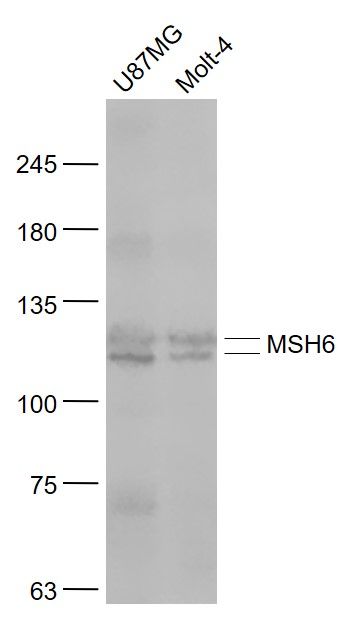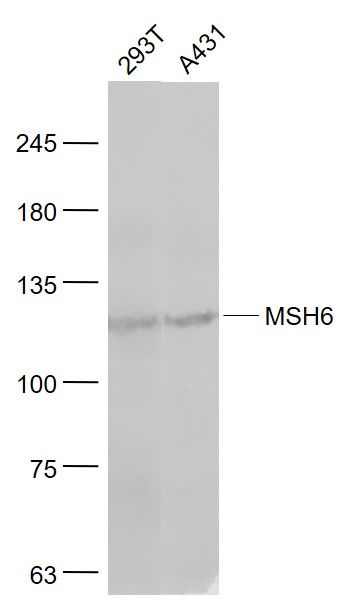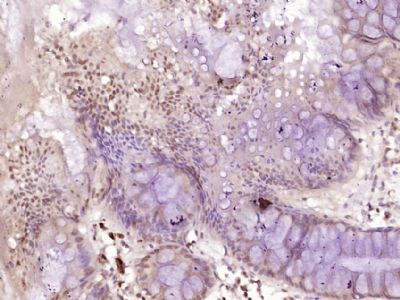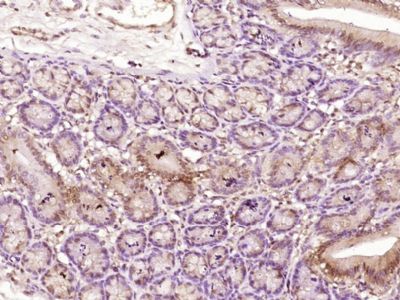产品中心
当前位置:首页>产品中心Anti-MSH6
货号: bs-3804R 基本售价: 1380.0 元 规格: 100ul
- 规格:100ul
- 价格:1380.00元
- 规格:200ul
- 价格:2200.00元
产品信息
- 产品编号
- bs-3804R
- 英文名称
- MSH6
- 中文名称
- 错配修复蛋白6抗体
- 别 名
- DNA mismatch repair protein MSH6; G/T mismatch binding protein; GTBP; GTMBP; HNPCC 5; HNPCC5; HSAP; MSH 6; mutS (E. coli) homolog 6; MutS alpha 160 kDa subunit; mutS homolog 6; p160; Sperm associated protein; MSH6_HUMAN.
- 规格价格
- 100ul/1380元购买 200ul/2200元购买 大包装/询价
- 说 明 书
- 100ul 200ulATP exchange, resulting in a discernible conformational transition that converts MutS alpha into a sliding clamp capable of hydrolysis-independent diffusion along the DNA backbone. This transition is crucial for mismatch repair. MutS alpha may also play a role in DNA homologous recombination repair.
Subunit:
Heterodimer consisting of MSH2-MSH6 (MutS alpha). Forms a ternary complex with MutL alpha (MLH1-PMS1). Interacts with EXO1. Part of the BRCA1-associated genome surveillance complex (BASC), which contains BRCA1, MSH2, MSH6, MLH1, ATM, BLM, PMS2 and the RAD50-MRE11-NBS1 protein complex. This association could be a dynamic process changing throughout the cell cycle and within subnuclear domains. Interacts with ATR.
Subcellular Location:
Nucleus.
Post-translational modifications:
The N-terminus is blocked.
Phosphorylated upon DNA damage, probably by ATM or ATR.
Phosphorylated by PRKCZ, which may prevent MutS alpha degradation by the ubiquitin-proteasome pathway.
DISEASE:
Defects in MSH6 are the cause of hereditary non-polyposis colorectal cancer type 5 (HNPCC5) [MIM:600678]. Mutations in more than one gene locus can be involved alone or in combination in the production of the HNPCC phenotype (also called Lynch syndrome). Most families with clinically recognized HNPCC have mutations in either MLH1 or MSH2 genes. HNPCC is an autosomal, dominantly inherited disease associated with marked increase in cancer susceptibility. It is characterized by a familial predisposition to early onset colorectal carcinoma (CRC) and extra-colonic cancers of the gastrointestinal, urological and female reproductive tracts. HNPCC is reported to be the most common form of inherited colorectal cancer in the Western world. Cancers in HNPCC originate within benign neoplastic polyps termed adenomas. Clinically, HNPCC is often divided into two subgroups. Type I: hereditary predisposition to colorectal cancer, a young age of onset, and carcinoma observed in the proximal colon. Type II: patients have an increased risk for cancers in certain tissues such as the uterus, ovary, breast, stomach, small intestine, skin, and larynx in addition to the colon. Diagnosis of classical HNPCC is based on the Amsterdam criteria: 3 or more relatives affected by colorectal cancer, one a first degree relative of the other two; 2 or more generation affected; 1 or more colorectal cancers presenting before 50 years of age; exclusion of hereditary polyposis syndromes. MSH6 mutations appear to be associated with atypical HNPCC and in particular with development of endometrial carcinoma or atypical endometrial hyperplasia, the presumed precursor of endometrial cancer. Defects in MSH6 are also found in familial colorectal cancers (suspected or incomplete HNPCC) that do not fulfill the Amsterdam criteria for HNPCC.
Similarity:
Belongs to the DNA mismatch repair MutS family.
Contains 1 PWWP domain.
SWISS:
P52701
Gene ID:
2956
Database links:Entrez Gene: 2956 Human
Entrez Gene: 17688 Mouse
Entrez Gene: 100360342 Rat
Omim: 600678 Human
SwissProt: P52701 Human
SwissProt: P54276 Mouse
Unigene: 445052 Human
Unigene: 18210 Mouse
Important Note:
This product as supplied is intended for research use only, not for use in human, therapeutic or diagnostic applications.
MSH6是DNA错配修复系统的基因组成之一。DNA错配修复系统由hMLH1,hMSH2,hPMS1,hPMS2,hMSH6和hMSH3等基因组成,这套系统的存在,可保证遗传物质的完整性和稳定性,避免遗传物质的突变产生,保证DNA复制的高保真度。
- 产品图片
 Sample:
Sample:
U87MG(Human) Cell Lysate at 30 ug
Molt-4(Human) Cell Lysate at 30 ug
Primary: Anti- MSH6 (bs-3804R) at 1/1000 dilution
Secondary: IRDye800CW Goat Anti-Rabbit IgG at 1/20000 dilution
Predicted band size: 153 kD
Observed band size: 120/121 kD Sample:
Sample:
293T(Human) Cell Lysate at 30 ug
A431(Human) Cell Lysate at 30 ug
Primary: Anti- MSH6 (bs-3804R) at 1/1000 dilution
Secondary: IRDye800CW Goat Anti-Rabbit IgG at 1/20000 dilution
Predicted band size: 153 kD
Observed band size: 121 kD Paraformaldehyde-fixed, paraffin embedded (Human colon carcinoma); Antigen retrieval by boiling in sodium citrate buffer (pH6.0) for 15min; Block endogenous peroxidase by 3% hydrogen peroxide for 20 minutes; Blocking buffer (normal goat serum) at 37°C for 30min; Antibody incubation with (MSH6) Polyclonal Antibody, Unconjugated (bs-3804R) at 1:400 overnight at 4°C, followed by operating according to SP Kit(Rabbit) (sp-0023) instructionsand DAB staining.
Paraformaldehyde-fixed, paraffin embedded (Human colon carcinoma); Antigen retrieval by boiling in sodium citrate buffer (pH6.0) for 15min; Block endogenous peroxidase by 3% hydrogen peroxide for 20 minutes; Blocking buffer (normal goat serum) at 37°C for 30min; Antibody incubation with (MSH6) Polyclonal Antibody, Unconjugated (bs-3804R) at 1:400 overnight at 4°C, followed by operating according to SP Kit(Rabbit) (sp-0023) instructionsand DAB staining. Paraformaldehyde-fixed, paraffin embedded (Rat colon); Antigen retrieval by boiling in sodium citrate buffer (pH6.0) for 15min; Block endogenous peroxidase by 3% hydrogen peroxide for 20 minutes; Blocking buffer (normal goat serum) at 37°C for 30min; Antibody incubation with (MSH6) Polyclonal Antibody, Unconjugated (bs-3804R) at 1:400 overnight at 4°C, followed by operating according to SP Kit(Rabbit) (sp-0023) instructionsand DAB staining.
Paraformaldehyde-fixed, paraffin embedded (Rat colon); Antigen retrieval by boiling in sodium citrate buffer (pH6.0) for 15min; Block endogenous peroxidase by 3% hydrogen peroxide for 20 minutes; Blocking buffer (normal goat serum) at 37°C for 30min; Antibody incubation with (MSH6) Polyclonal Antibody, Unconjugated (bs-3804R) at 1:400 overnight at 4°C, followed by operating according to SP Kit(Rabbit) (sp-0023) instructionsand DAB staining.

